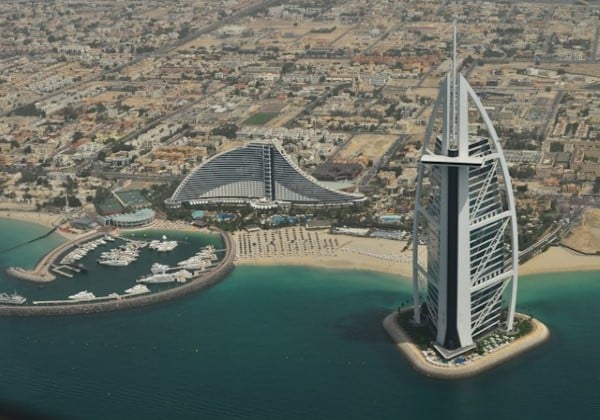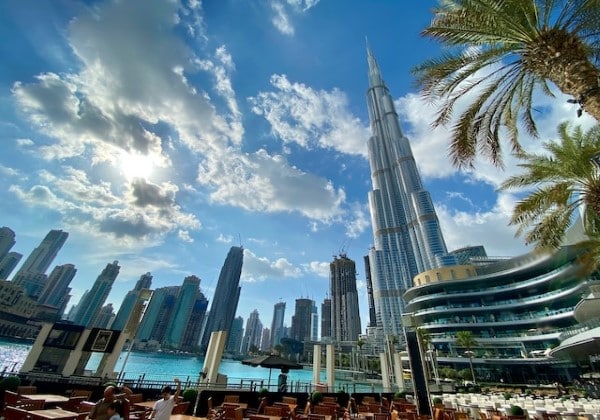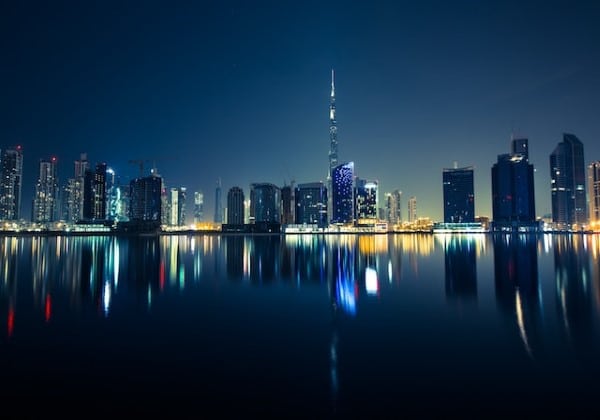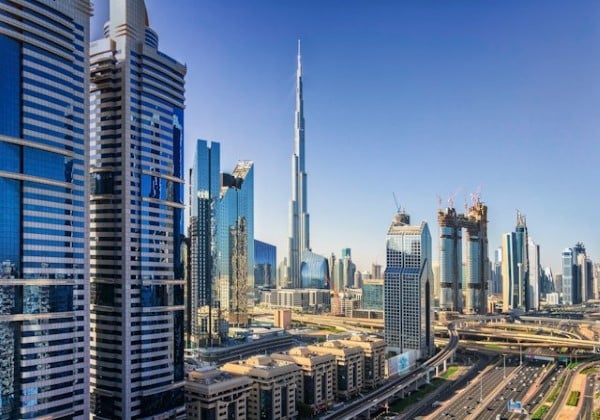
Living in Dubai as an expat offers unparalleled opportunities and unmatched quality of life. Dubai is ranked 24th on the Global Passport Index, and the UAE is the epitome of opulence and advancement, attracting expats seeking a multifaceted and sophisticated lifestyle.
In this comprehensive guide for expats, we will explore this innovative city’s intricacies, and share insights into what it is like to live in Dubai as an expat, how to move to Dubai and acquire residency, and equip you with the knowledge to navigate tax, education, healthcare, and the cultural and social nuances of the city’s dynamic landscape.
What's it Like Living in Dubai?
Dubai is an attractive destination for tourists, and in recent years, expat communities have developed in the city center and more affordable areas. Foreign investors, American expats, and many expats from other countries are now able to move to Dubai and other major cities after the UAE government introduced visa options such as the UAE Golden Visa, Remote Work Visa, and the Family Visa.
Dubai living: The pros and cons
As in your home country and many other countries and cities across the globe, there are pros and cons of expat life in this vibrant city nestled in the Arabian desert.
Pros of living in Dubai
Travel accessibility: Dubai is easily accessible for international travelers and has two international airports, one of which is the magnificent Dubai International Airport. Dubai International Airport is the world’s busiest airport measured by international passenger traffic. Located just three miles from the city center, it is easy to navigate, and there are a variety of transport options to get you where you need to be upon arrival, including private taxis, Uber, and the Dubai Metro.
Low crime rate: Strict laws and a visible police presence make Dubai and Abu Dhabi the safest cities in the Middle East for expats and tourists. According to a crime comparison by Numbeo between Dubai and New York, the level of crime in Dubai is a low 12 percent compared to the moderate 54 percent in New York.
No income tax: Many expats consider moving to Dubai for the tax benefits. Thanks to the UAE government’s no-income-tax policy, you will be able to earn a tax-free salary, depending on your residency status and tax residency. Expat residents will still pay taxes such as rental tax and VAT (sales tax) for general goods and services.
Quality healthcare: The UAE’s healthcare system ranked 19th in the 2022 World Index of Healthcare Innovation. Dubai has state-of-the-art hospitals and clinics that provide quality healthcare to Dubai’s population and expat residents. Keep in mind that expat residents and tourists from a foreign country are required to have health insurance when applying for entry visas and residence visas.
World-class education: Dubai has a top-tier education system and is home to a selection of top-ranking international universities. There are also public schools that primarily cater to Dubai’s population, as well as private and international schools, that welcome both expats and UAE citizens. Its well-established international and national curriculum caters to students at all levels and offers a world-class learning environment.
Employment opportunities: As Dubai grows and develops lucrative job and global business opportunities for American expats and expats from other countries are on the rise. There are many work opportunities for skilled workers in the scientific field, engineers, healthcare professionals, teachers, digital marketers, and more.
A diverse multinational expat community: Due to the growing economy and broad availability of business and job opportunities, you will find a diverse multinational expat community in Dubai. According to the 2023 UAE population statistics, expatriates make up 89 percent of the UAE’s overall population.
Cons of living in Dubai

Extreme summer heat: If your home country has a moderate climate and you’re not accustomed to warmer temperatures, adapting to Dubai’s climate may be challenging. Dubai’s summers are extremely hot and humid, and temperatures can peak at 109 °F (43 °C) in July and August. As Dubai is nestled in the Arabian desert, it does not receive rainfall often, and when it does, it only lasts for a short period.
Strict local laws: As a Muslim country, the local Islamic law is quite strict in Dubai. It is important to educate yourself on the religious culture and customs before living abroad in Dubai. For instance, there are restrictions on how and where tourists and expat residents can consume alcohol, strict laws ensuring women wear modest attire in public spaces, and limitations on eating in public during the day during Ramadan.
Working in Dubai: Jobs and salaries
Dubai’s bustling economy is growing at a rapid pace and presents a wealth of opportunities for professionals and entrepreneurs seeking career advancement. As the city evolves, it cultivates an expanding landscape of lucrative job prospects and global business ventures, catering to American expats and diverse array of international talent. Renowned as a vibrant centre for business, finance, tourism, and trade, Dubai’s multifaceted economy attracts skilled individuals in various professions to its competitive job market.
According to a 2023 LinkedIn report, engineers, software developers, data scientists, digital marketers, healthcare professionals, educators, sales, customer service, HR specialists, accountants, lawyers, and management professionals are currently a few of the most sought-after roles in Dubai. Salaries in Dubai for these categories of skilled professionals range between AED 12,000 and AED 25,000 ($3,300 and $6,810) per month.
Navigating tax in Dubai
As previously mentioned, the UAE’s no-income-tax policy offers citizens and expats alike a unique proposition: earning a tax-free salary. While expat residents navigate rental tax and VAT on goods and services, the absence of the requirement to pay income tax, capital gains tax, wealth tax, or inheritance tax underpins the appeal for moving to Dubai.
The UAE also has taxation treaties with several countries, including Portugal, Canada, Spain, and the UK, protecting individuals and businesses from double taxation on their earnings. However, the UAE introduced corporate tax in June 2023. The corporate tax is set at nine percent on profits surpassing AED 375,000 (approximately $102,000), which is still a lower corporate tax threshold compared to other countries, maintaining that Dubai’s tax system provides an efficient environment for expats and businesses alike to prosper.
Education in Dubai
Finding an international school offering world-class education is not difficult in Dubai. The city has a network of international schools that offer the national curriculum as well as private primary schools and secondary schools that teach according to the British education system where expat children can enroll. The city’s official language, Arabic, coexists harmoniously with the widely spoken English, creating an accommodating learning environment for expat children and offering the opportunity to learn Arabic.
As mentioned before, school fees are quite expensive in Dubai and range from AED 12,723 to AED 64,093 ($3,463 to $17,449) annually, a significant financial consideration for expat families. However, for those investing in these institutions, Dubai not only promises an education on par with global standards, but international schools also serve as a hub to make connections with other expats, making it a great place for families to engage and connect in a diverse, multicultural community.
How to Move to Dubai
To move to Dubai, you must first apply for an entry visa, which can be done online through the General Directorate of Residency and Foreign Affairs Dubai (GDRFAD Dubai) or the local Embassy of the United Arab Emirates in your country of origin. Once you receive your entry visa, which is valid for 60 days upon arrival, you will need to apply for a residence visa in Dubai according to the reasons and period of your stay.
The benefits of a Dubai residence visa
Besides the opportunity to live in a vibrant and innovative city in one of the most beautiful countries in the world, there are a number of benefits you can enjoy with a UAE residency visa. Life in Dubai will be seamless with the ability to do the basics with ease, such as opening a bank account, getting an Emirates ID and local driving license and leasing a car, and having access to world-class health services through the Dubai state and private services if you have private health insurance.
Once you have obtained your residency visa, you will also be able to have close family members join you in Dubai. The list of eligible family members includes your spouse and children. With a Dubai residence permit, your children will be able to enroll in the top-tier public and private schools the city offers. You and your family will also have the opportunity to explore the world together as Dubai has an agreement with several countries that allows Dubai residents visa-free travel. The list of visa-free countries includes Germany, Japan, Maldives, Qatar, Singapore, Fiji, South Africa, and the Cook Islands.
The types of residence visas in Dubai
Now let’s take a look at the different types of visas you can apply for to become a resident in Dubai.
The UAE Golden Visa

The UAE Golden Visa requirements
The requirements for the UAE Golden visa depend on the applicant’s professional background. However, there are several minimum requirements that all prospective applicants must meet, which are:
- Be over 18
- Provide a notarized copy of their valid passport
- Have a clean criminal record
- Be clear of all socially dangerous illnesses
- Valid health insurance
The benefits of a UAE Golden Visa
Acquiring the UAE Golden Visa and establishing residency in Dubai boasts unparalleled benefits. Enjoy long-term residency without personal income tax, capital gains tax, wealth tax, or inheritance tax. This visa allows foreign talents to live, work, or study in the UAE, offering a six-month multiple-entry entry visa and a renewable five or 10-year residence permit. Not requiring a sponsor provides independence, and the flexibility to stay outside the UAE longer maintains the validity of the visa. Moreover, this visa extends the privilege of sponsoring family members, irrespective of their ages, allowing them to stay in Dubai until the permit expires. Access to world-class healthcare and education further enriches the experience, making Dubai an inviting and advantageous location for those seeking long-term residency and exceptional living standards.
UAE Student Visa
Expats over the age of 18 who have been accepted into a university in Dubai and are financially sponsored by a parent who is a resident of the UAE or the university you will be attending can apply for a student visa. The time period granted for this visa is one year and annually renewable for the same time frame by providing proof of continuation of studies from the educational institution until you have completed your course. To apply for a student visa, you must submit your certificate issued by the university specifying the duration of the study and the other general requirements and documents for the residence visa, which we will list in detail below.
UAE Work Visa
The UAE Work Visa is for individuals who have accepted a job offer and signed a contract with a company in Dubai. You can also apply for this visa when the company you work for relocates to Dubai or if you opt to transfer to your employer’s offices in the country. You can be employed in the private sector or the government sector, and this visa lasts for a time period of two years before it needs to be renewed or changed. Private sector employees can apply for the work visa themselves through the GDRFAD Dubai portal, while those employed in the government sector will receive application assistance from an employer.
UAE Green Visa

If you apply as a freelancer, you will need to submit your proof of education, proof of annual income from the last two years, which amounts to no less than AED 360,000 ($98 000), and your freelance or self-employment permit from the Ministry of Human Resources and Emiratisation (MoHRE). The application requirements are the same for highly skilled employees. However, you will have to possess a valid employment contract, be classified in the first, second, or third occupational level according to the MoHRE, and earn a minimum salary of AED 15,000 ($4,100) or more.
UAE Remote Work Visa
Recently introduced by the United Arab Emirates, the Remote Work Visa, also referred to as the Virtual Work Residence Visa, is one of the easiest visa options to apply for when you move to Dubai. This one-year renewable visa enables expats to live in Dubai and other cities of the UAE for up to a year before it must be renewed, provided that they work remotely for an organization employer abroad outside the UAE. When you apply for the remote work visa, you must provide proof of employment with a contract valid for one year, earn a minimum salary of AED 18,360 ($5,000), and submit your latest salary slip with bank statements from three previous months. Once you have received your residence visa, you will be able to sponsor your spouse or child to join you in Dubai.
UAE Retirement Visa
This UAE Retirement Visa is a long-term visa of five years issued to retired expats who wish to spend their retirement in Dubai and have the financial means to do so. To be eligible for the retirement visa, you must have worked for no less than 15 years inside or outside the UAE, or be 55 years old or older at the time of application. Further eligibility requirements include owning property or having financial savings worth no less than AED 1 million ($272,000). You will also be eligible for the visa if you have a monthly income of AED15,000 ($4,100). To apply for this visa, you will need to provide bank statements for the last six months along with the documents required when applying for a residence visa in the UAE which we will discuss below.
Required documents for applying for a UAE Residence Visa
When applying for a UAE residence visa, several essential documents are necessary to complete the process:
- Valid passport (with extended validity for six months)
- Entrance visa
- UAE Visa Application Form (available online at GDRFAD Dubai)
- Two passport-size photographs meeting UAE visa photo requirements
- Proof of sponsor’s lawful residency/citizenship in the UAE
- Proof of employment or family relations provided by the sponsor to validate the visa
- Additional documents specific to the visa type
- UAE health insurance proof (valid for at least six months and covering UAE residency)
- Medical fitness test certificate
- Family links documentation (e.g. birth/marriage certificates for family visa applications)
What is the Cost of Living in Dubai?
The cost of living in Dubai is quite comparable to the cost of living in central London and New York. School fees, home rentals, and entertainment are the costs that make living in Dubai fairly expensive. However, the absence of income tax on salaries and the prices of general goods and services still make it an affordable city to live in, dependant on factors such as your income and number of dependants of course. According to a data analysis on Numbeo, without accounting for rent living in Dubai is 36.8 percent less expensive than living in New York. Additionally, the summary of the cost of living in Dubai projects that a single person’s estimated monthly costs are 3,917.5AED ($1,066.7) without rent, while supporting a family of four would cost 13,619.0AED ($3,708.3) per month, without accounting for rent.
Take a look at a few cost comparisons from a Numbeo comparison between the cost of living in New York and Dubai below:
| ITEM | DUBAI COST | NEW YORK COST |
| Regular cappuccino | $5.51 | $5.53 |
| Dining out | $68.07 | $120.00 |
| Annual international school fees | $13,509.39 | $41,133.33 |
| Three-bedroom city apartment | $3,920.59 | $7,579.04 |
The Best Neighborhoods to Live in Dubai
The stunning Dubai skyline features contemporary government buildings, shopping malls, and futuristic corporate headquarters amid towering skyscrapers such as the world’s tallest building, the iconic Burj Khalifa.
The entire city offers a variety of accommodation options for tourists, citizens, and expats living in Dubai, including hotels, residential estates or apartments, and private beach clubs that offer ultimate luxury. You can find the perfect place to live in the city centre or in other sought-after areas, from the Palm Jumeirah artificial island to the coveted Dubai Marina. In this section, we will have a look at the best neighborhoods to live in, whether you’re in search of luxury accommodation or a decent rental apartment at an affordable price.
Luxury real estate in Dubai

Right next to the stunning Ritz Carlton, the Dubai Marina hugs the coastline and offers stunning waterfront luxury apartments and villas. This Dubai Marina is famed for its vibrant social scene and offers tourists, citizens, and expats living in Dubai exciting nightlife, exquisite dining, and upscale shopping malls. Meanwhile, Downtown Dubai offers the comfort of luxury and convenience and is surrounded by iconic landmarks like the Burj Khalifa, Dubai Fountain, and the Dubai Mall. Upmarket apartments and villas in Downtown Dubai are sought-after for the access to the cosmopolitan lifestyle they offer.
The cheapest places to live in Dubai
Northeast of downtown Dubai, Old Dubai, lies the city’s more budget-friendly zones, catering to expats seeking affordable housing or detached houses in tranquil settings away from the urban buzz. Popular among immigrants, you will find the charming Bur Dubai neighborhood. Bur Dubai is home to the iconic Al Fahidi Historical Neighborhood and the revered Dubai Museum and embraces the city’s historical charm. Deira, neighboring the Dubai International Airport, offers unique allure, while Al Karama, just beyond the striking Dubai Frame, stands out for its easy metro connectivity, diverse dining spots, and bargain shopping havens.
These neighborhoods are beautiful multicultural communities, bustling with cafes, malls, and metro stations, complemented by international schools for access, convenience, and a well-rounded living experience at a lower cost. Their narrow streets form enchanting mazes, leading to vibrant souks (traditional Dubai shops) where a treasure trove of goods, from spices to textiles and jewelry, awaits eager shoppers. A blend of affordability, cultural richness, and tradition defines the corners of Old Dubai.
What is the Quality of Life in Dubai?
Dubai offers a unique blend of cosmopolitan living, cultural diversity, and cutting-edge amenities. Let’s explore the quality of life you can expect in Dubai when it comes to safety and accessibility, culture and tradition, and everything in between.
How open is Dubai culture to outsiders
UAE citizens in both Dubai and Abu Dhabi are friendly and welcoming to tourists and expats living in the UAE. However, it is recommended that you learn as much as you can about Dubai’s culture and rules before you go.
Is Dubai safe and accessible?
Dubai is one of the safest Middle Eastern cities for tourists and expats to visit and live in, and because of the strict laws in the UAE, the crime rate in Dubai is much lower compared to other global cities. Dubai is also extremely accessible for international travelers through the Dubai International Airport. The city is easy to navigate, and you do not need to learn Arabic to communicate with the locals because English is widely spoken in Dubai. There are also a variety of public transport options to get from A to B, including private taxis, Uber, and the Dubai Metro.
Are UAE citizens open and friendly?
UAE citizens are definitely friendly and welcoming to tourists and expats living in Dubai. You will also find a large expat community in the city center and other areas of Dubai’s multicultural landscape.
Entertainment in Dubai
Dubai has a vibrant social scene and offers a large variety of entertainment options for you to explore, from glamourous shopping malls like the Dubai mall to adventurous activities like desert safaris. You can also get in touch with Dubai’s traditions and culture by visiting the Dubai Museum or Al Fahidi Historical Neighborhood. If you have a little more to blow in your bank account, you can go on an exclusive tour of the Burj Khalifa, or opt for a luxury yacht tour.
Transport in Dubai
Once you have obtained your residence visa in Dubai, you can get a local driving license and lease a car. Dubai also has a safe and efficient public transport system that includes the Dubai metro and connecting busses. If you looking for a more scenic commute for your days off, you can use the services of an abra which is a traditional wooden boat, or the Dubai ferry that connects the Dubai marina to other areas. Dubai also has taxis and Uber running throughout the city. Overall, transport in Dubai is easy to navigate, and there are a variety of options to suit your needs and budget.
Cultural etiquette in Dubai
As mentioned before, it is recommended that you learn as much as you can about Dubai’s culture and rules before you go. It is important to know that the use of alcohol is regulated in Dubai, and a license is required for purchase and sale. Expats and tourists can drink at home or licensed venues. When it comes to public attire, modesty is key, particularly for women in public. Women are advised to wear knee-length clothing that covers shoulders and midriffs. Respect for religious spaces is expected, necessitating adherence to the respective dress codes when visiting mosques, temples, or churches. During Ramadan, the ninth month of the Islamic calendar, a fasting period unfolds where public consumption of food, drink, smoking, or even chewing gum is prohibited during daylight hours, applying to both Muslims and non-Muslims, except for pregnant women and small children.
What Are the Most Popular Places to Visit in Dubai?
The Burj Khalifa
The Burj Khalifa is Dubai’s iconic skyscraper and the world’s tallest building. The stunning building features corporate suites, luxury residences, the Armani Hotel Dubai, an observation deck where you can take in scenic views, and fine dining restaurants like At.Mosphere.
Yachting
Yachting on the Dubai coastline is a popular activity for locals and tourists. You can charter a superyacht for the day or book a private boat for your family and friends.
Sand dune adventures
The Arabian desert offers so much adventure for friends and family to enjoy. You can go camping in the desert, go dune surfing and even book a desert tour on camelback.
Aura Skypool
Located in the Palm Tower in the Palm Jumeirah district of Dubai, the infinity Aura Skypool offers a chance to cool off and unwind with breathtaking views of the Dubai skyline sitting in the pool.
The Dubai Mall
Located in Downtown Dubai, the Dubai Mall is the largest mall in the world and offers a shopping experience to match. You can shop for luxury brands, experience exciting events and exclusive international offers, and take the kids to the Dubai Aquarium and Underwater Zoo.
Al Fahidi Historical Neighborhood
With its construction dating back to the late 1800s, the Al Fahidi Historical Neighborhood is one of the most authentic places to explore Dubai’s culture, heritage, and architecture.
Dubai Miracle Garden
Known as the world’s largest natural flower garden, the Dubai Miracle Garden offers a scenic experience exploring intricate pathways and vibrant displays of natural blooming flowers and artistic arrangements.
Frequently Asked Questions About Living in Dubai
Is living in Dubai worth it?
This depends on your decision after weighing the pros and cons of living in Dubai. Living in Dubai is worth it if you are looking to live abroad in a vibrant city while earning a tax-free salary, and are able to navigate the cultural differences, extreme summer climate, and other cons that come with life in Dubai.
What salary do I need to live in Dubai?
Considering that the cost of living in Dubai is quite comparable to cities like London and New York, you should earn a minimum salary of AED 18,360 ($5,000) or more to live comfortably in Dubai.
Is living in Dubai with family expensive?
School fees, home rentals, and entertainment are the costs that make living in Dubai fairly expensive. Therefore, a family of four or more living in Dubai with a family can prove to be considerably pricey.
What are the disadvantages of living in Dubai?
The disadvantages of living in Dubai include a high cost of living, even though the cost of living in Dubai is more affordable than in top expat choice cities like Singapore, London, and New York. If your home country has a moderate climate and you’re not accustomed to warmer temperatures, adapting to Dubai’s climate may be a challenge. Also, local laws are quite strict in Dubai. It is important to educate yourself on the religious culture and customs before living abroad in Dubai.
Can you live in Dubai as a foreigner?
You can live in Dubai as a foreigner if you apply for an entry visa and, upon arrival, apply for a residence visa that you are eligible for. You can apply for a Work Visa, a Remote Worker Visa, a Retirement Visa, or become a resident by investment through the UAE Golden Visa program.
Is Dubai and the UAE expat-friendly?
UAE citizens in both Dubai and Abu Dhabi are friendly and welcoming to tourists and expats living in the UAE.
Is living in Dubai safe?
Dubai is one of the safest Middle Eastern cities for tourists and expats to visit and live in and offers residents luxury and a high standard of living. The city is safe and clean, and operates with world-class infrastructure, making life in Dubai smooth and comfortable. Compared to other global cities, Dubai’s crime rate is notably low. This is due to strict laws and effective enforcement by the UAE state.
Can I live in Dubai permanently?
You can obtain permanent residence in Dubai through visas such as the Retirement Visa and the UAE Golden Visa. Once you obtain residency in Dubai, you will receive your UAE Government-issued identity card, the Emirates ID for the UAE’s citizens and residents. It is mandatory for all UAE citizens and residents to apply for an Emirates ID.




